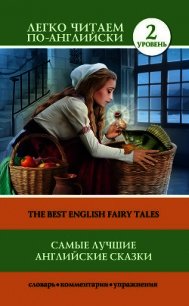More English Fairy Tales - Jacobs Joseph (читать книги полностью txt) 📗
Next day she knew not what to do for grief. Then she broke the pear, and found it filled with jewellery far richer than the contents of the apple. With these jewels she bargained for permission to be a second night in the young knight’s chamber; but the old wife gave him another sleeping drink, and again he slept till morning. All night she kept sighing and singing as before:
Still he slept, and she nearly lost hope altogether, But that day, when he was out hunting, somebody asked him what noise and moaning was that they heard all last night in his bedchamber. He said: “I have heard no noise.” But they assured him there was; and he resolved to keep waking that night to try what he could hear. That being the third night and the damsel being between hope and despair, she broke her plum, and it held far the richest jewellery of the three. She bargained as before; and the old wife, as before, took in the sleeping drink to the young knight’s chamber; but he told her he couldn’t drink it that night without sweetening. And when she went away for some honey to sweeten it with, he poured out the drink, and so made the old wife think he had drunk it. They all went to bed again, and the damsel began, as before, singing:
He heard, and turned to her. And she told him all that had befallen her, and he told her all that had happened to him. And he caused the old washerwife and her daughter to be burnt. And they were married, and he and she are living happy to this day for aught I know.
Yallery Brown
Once upon a time, and a very good time it was, though it wasn’t in my time, nor in your time, nor any one else’s time, there was a young lad of eighteen or so named Tom Tiver working on the Hall Farm. One Sunday he was walking across the west field, ’t was a beautiful July night, warm and still and the air was full of little sounds as though the trees and grass were chattering to themselves. And all at once there came a bit ahead of him the pitifullest greetings ever he heard, sob, sobbing, like a bairn spent with fear, and nigh heartbroken; breaking off into a moan and then rising again in a long whimpering wailing that made him feel sick to hark to it. He began to look everywhere for the poor creature. “It must be Sally Bratton’s child,” he thought to himself; “she was always a flighty thing, and never looked after it. Like as not, she’s flaunting about the lanes, and has clean forgot the babby.” But though he looked and looked, he could see nought. And presently the whimpering got louder and stronger in the quietness, and he thought he could make out words of some sort. He hearkened with all his ears, and the sorry thing was saying words all mixed up with sobbing—
“Ooh! the stone, the great big stone! ooh! the stones on top!”
Naturally he wondered where the stone might be, and he looked again, and there by the hedge bottom was a great flat stone, nigh buried in the mools, and hid in the cotted grass and weeds. One of the stones was called the “Strangers’ Table.” However, down he fell on his knee-bones by that stone, and hearkened again. Clearer than ever, but tired and spent with greeting came the little sobbing voice—“Ooh! ooh! the stone, the stone on top.” He was gey, and mis-liking to meddle with the thing, but he couldn’t stand the whimpering babby, and he tore like mad at the stone, till he felt it lifting from the mools, and all at once it came with a sough out o’ the damp earth and the tangled grass and growing things. And there in the hole lay a tiddy thing on its back, blinking up at the moon and at him. ’T was no bigger than a year-old baby, but it had long cotted hair and beard, twisted round and round its body so that you couldn’t see its clothes; and the hair was all yaller and shining and silky, like a bairn’s; but the face of it was old and as if ’t were hundreds of years since ’t was young and smooth. Just a heap of wrinkles, and two bright black eyne in the midst, set in a lot of shining yaller hair; and the skin was the colour of the fresh turned earth in the spring—brown as brown could be, and its bare hands and feet were brown like the face of it. The greeting had stopped, but the tears were standing on its cheek, and the tiddy thing looked mazed like in the moonshine and the night air.
The creature’s eyne got used like to the moonlight, and presently he looked up in Tom’s face as bold as ever was; “Tom,” says he, “thou ’rt a good lad!” as cool as thou can think, says he, “Tom, thou ’rt a good lad!” and his voice was soft and high and piping like a little bird twittering.
Tom touched his hat, and began to think what he ought to say. “Houts!” says the thing again, “thou needn’t be feared o’ me; thou ’st done me a better turn than thou know’st, my lad, and I’ll do as much for thee.” Tom couldn’t speak yet, but he thought; “Lord! for sure ’t is a bogle!”
“No!” says he as quick as quick, “I am no bogle, but ye ’d best not ask me what I be; anyways I be a good friend o’ thine.” Tom’s very knee-bones struck, for certainly an ordinary body couldn’t have known what he’d been thinking to himself, but he looked so kind like, and spoke so fair, that he made bold to get out, a bit quavery like—
“Might I be axing to know your honour’s name?”
“H’m,” says he, pulling his beard; “as for that”—and he thought a bit—“ay so,” he went on at last, “Yallery Brown thou mayst call me, Yallery Brown; ’t is my nature seest thou, and as for a name ’t will do as any other. Yallery Brown, Tom, Yallery Brown’s thy friend, my lad.”
“Thankee, master,” says Tom, quite meek like.
“And now,” he says, “I’m in a hurry to-night, but tell me quick, what’ll I do for thee? Wilt have a wife? I can give thee the finest lass in the town. Wilt be rich? I’ll give thee gold as much as thou can carry. Or wilt have help wi’ thy work? Only say the word.”
Tom scratched his head. “Well, as for a wife, I have no hankering after such; they’re but bothersome bodies, and I have women folk at home as ’ll mend my clouts; and for gold that’s as may be, but for work, there, I can’t abide work, and if thou ’lt give me a helpin’ hand in it I’ll thank—”
“Stop,” says he, quick as lightning, “I’ll help thee and welcome, but if ever thou sayest that to me—if ever thou thankest me, see’st thou, thou ’lt never see me more. Mind that now; I want no thanks, I’ll have no thanks;” and he stampt his tiddy foot on the earth and looked as wicked as a raging bull.
“Mind that now, great lump that thou be,” he went on, calming down a bit, “and if ever thou need’st help, or get’st into trouble, call on me and just say, ’Yallery Brown, come from the mools, I want thee!’ and I’ll be wi’ thee at once; and now,” says he, picking a dandelion puff, “good-night to thee,” and he blowed it up, and it all came into Tom’s eyne and ears. Soon as Tom could see again the tiddy creature was gone, and but for the stone on end and the hole at his feet, he’d have thought he’d been dreaming.


